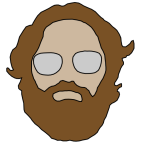
[Previously: Week 1 Review]
Yesterday I wrote for 4 hours and 24 minutes. A new record for this challenge!
Reading and writing both seem to revolve around altered mental states. With respect to reading, John Gardner in The Art of Fiction refers to this state as the “vivid and continuous fictional dream”:
If we carefully inspect our experience as we read, we discover that the importance of physical detail is that it creates for us a kind of dream, a rich and vivid play in the mind. We read a few words at the beginning of the book or the particular story, and suddenly we find ourselves seeing not words on a page, but a train moving through Russia, an old Italian crying, or a farmhouse battered by rain. We read on – dream on – not passively but actively, worrying about the choices the characters have to make, listening in panic for some sound behind the fictional door, exulting in characters’ successes, bemoaning their failures. In great fiction, the dream engages us heart and soul; we not only respond to imaginary things – sights, sounds, smells – as though they were real, we respond to fictional problems as through they were real: We sympathize, think, and judge.
The best reading is when we slip into this spell quickly and have difficulty leaving it: we lose track of time while in the book, and we keep daydreaming in its world for a while after we’ve stopped reading.
At the end of the day, all the elements of good writing (grammar, punctuation, plot, theme, characterization, etc.) are in service to that reader’s dream. It isn’t bad, per se, to break the “rules” for any of these elements; it’s that breaking the rules often interrupts the reader from the dream – at that is the sin. The spell has been broken, they’ve been pulled out of the story, and are now just looking at the writer’s words.
But writers seem to have their own ideal state. From what I can tell, it’s a state of seamless switching between the dream state of the reader and flow state of the builder: both passenger and conductor at the same time. Stephen King calls writing “self-hypnosis”, and it brings to light why so many professional writers have strict and stereotyped writing routines: these are cues and rituals which help prime their minds to enter the writing state.
Which brings to mind the second, personal craft of writing: learning how to avoid breaking your own spell when you sit down to write, so that you can get in and stay in “the zone” easier and longer. This week I am turning off the Internet during the afternoon afternoon hours when I normally write to see if that helps.
[Random But Related Tip: I am highly distracted by environmental sounds, and I have found that wearing noise reduction safety ear muffs (e.g. the kind that people use at shooting ranges) to be great for minimizing this distraction. They are cheap too.]

The Darn Ecologist
